Undergraduate Fellows
Undergraduate Fellows
-
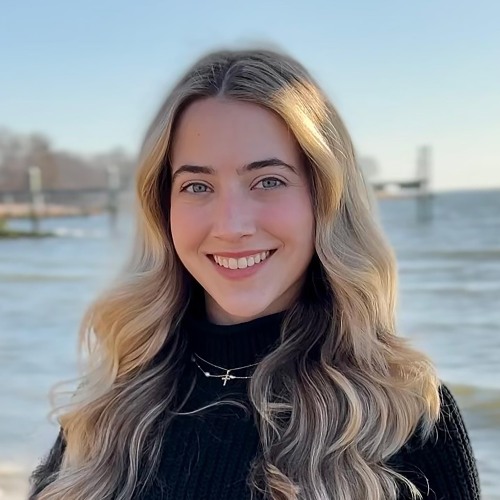
Camille Blanco
2025–26 Undergraduate Fellow, concentrating in Classics and History of Art and ArchitectureProject “Caesar and the Gauls: Mapping Roman Provincial Identity Through the Funerary Monuments of Roman Gaul, 50 BCE to 486 CE”Camille Blanco ’26 is an undergraduate concentrating in Classics and the History of Art and Architecture. Her thesis, tentatively titled “Caesar and the Gauls: Mapping Roman Provincial Identity Through the Funerary Monuments of Roman Gaul, 50 BCE to 486 CE,” studies the development of a hybrid “Roman” identity through funerary art produced in Gallia Narbonensis (the South of France) during the period between Caesar’s conquest and the Frankish victory at Soissons. In investigating stylistic and thematic changes in Gallo-Roman funerary art, along with Latin texts and contemporary theoretical frameworks (including viewership, postcolonial theory, and hybridity), Blanco argues that Gallic populations sustained, transformed, and even relinquished their indigenous artistic traditions in response to dominant imperial ones. Her broad academic research interests include the history and influences of the early modern art market (ca. 1750–1950), early modern collecting practices, Imperial Roman funerary art, Late Antique Latin poetry, classical reception in the Baroque era, and European Decorative Arts. An avid art lover, she has written articles for the Brown Art Review as the Art Crimes Columnist. She is also Editor-in-Chief of the Art Review and the Brown Classical Journal, and the Department Undergraduate Group (DUG) Leader for the Department of Classics.
-
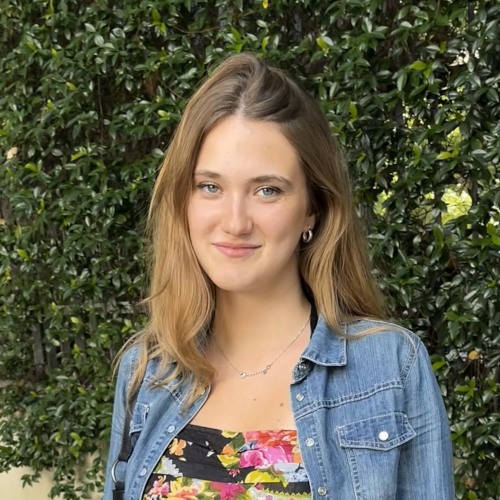
Martina Herman
2025–26 Undergraduate Fellow, concentrating in Comparative Literature and Literary ArtsProject “Choreographies of Power: Dance, Policing, and Political Agency Across the Post-Modern Tradition”Martina Herman ’26 is an undergraduate concentrating in Comparative Literature and Literary Arts. Working primarily in Spanish, English, German, and Portuguese, she is interested in the intersections between contemporary dance and political philosophy. She is interested in thinking about how gesture, movement, and circulation pathways can become locations for intersubjectivity. In her thesis, tentatively titled “Choreographies of Power: Dance, Policing, and Political Agency Across the Post-Modern Tradition,” she seeks to analyze how the performative quality of dance, and the kinesthetic dimension that shapes it, become a location of agency within choreography that breaks away from a logic of policing. In its allocation of roles and functions to bodies and their distribution through space, policing is essentially choreographic and affects the nature of contemporary intersubjective connection and social interaction. Tracing the disruptive-performative-political quality of movement, Herman’s project will compare how artists from Brazil, USA, Australia, and Europe digest notions of the political to craft new pathways of circulation, allocation of space and intersubjective relations. Her other research interests include Jewish thought, postmemory, post-structuralism, ecopoetics, and reading practices. Her artistic practice in dance and poetry also focuses on the intersections of language and the body.
-
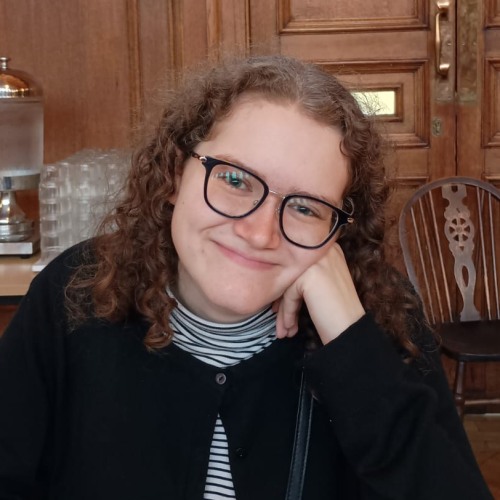
Aubrie Miller
2025–26 Undergraduate Fellow, concentrating in Comparative Literature, English, and History of Art and ArchitectureProject “‘I will be free… in words’: Viewing Gender through a Bibliographic Lens in Shakespeare’s Plays”Aubrie Miller ’26 is an undergraduate concentrating in English, Comparative Literature, and History of Art and Architecture. Her thesis, tentatively titled “‘I will be free… in words’: Viewing Gender Through a Bibliographic Lens in Shakespeare’s Plays,” analyzes when bibliographic language (language referring to book-making or book-using) is used to characterize women in a selection of Shakespeare’s plays. Her research uses the history of the book to understand women’s relationship to material texts in the early modern period. She spent the 2024–25 academic year as a visiting student at the University of Oxford. Outside of the Cogut Institute, she is a member of Brown University’s Presidential Scholars Program and a Special Collections Curatorial Assistant at the John Hay Library. She is also co-writing an article with a Columbia University Ph.D. candidate on the ecology of the archive of Katharine S. White (The New Yorker’s first fiction editor) and is compiling a bibliography for the Society for the History of Authorship, Reading, and Publishing (SHARP).
-
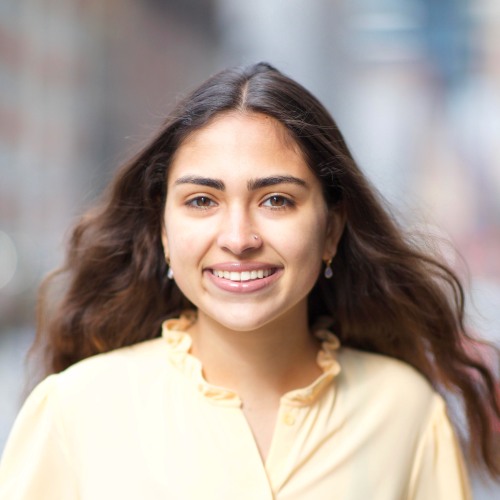
Indigo Mudbhary
2025–26 Undergraduate Fellow, concentrating in Ethnic Studies and HistoryProject “Unsettling the Remote/Mobile Binary in Nepal”Indigo Mudbhary ’26 is an undergraduate concentrating in Ethnic Studies and History. She is interested in how mobility and remoteness are made out to be opposing forces in contemporary Nepal in ways that maintain hierarchies of caste, class, gender, ethnicity, and other identity markers, alongside ideas of nation and nationalism. Her thesis, titled “Unsettling the Remote/Mobile Binary in Nepal,” details how various actors strategically use discourses of remoteness and mobility in contemporary Nepal. The thesis will include four case studies to explore how these narratives appear at different moments, specifically in the context of Indigenous-led missionary work in Nepal, Bollywood films on Everest, nonprofits that work with rural communities, and post-monarchy governmental classifications of remoteness. The methods will include archival research, ethnography, and oral history. Through this work, Mudbhary ultimately hopes to historicize remoteness and demonstrate that it is not inherent to a landscape but rather a specific gaze that emerges from colonial lineages within South Asia, one that many actors, including those who live in these so-called remote landscapes, have manipulated to their own ends. She aims to explore other ways of looking at these environments as well.
-
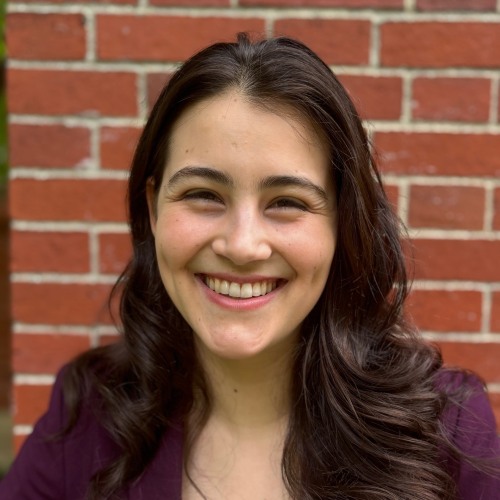
Talia Sherman
2025–26 Undergraduate Fellow, concentrating in English and LinguisticsProject “The Work of Language: Political, Productive, and Paradoxical Operations”Talia Sherman ’26 is an undergraduate student concentrating in English and Linguistics. Her thesis project, tentatively titled “The Work of Language: Political, Productive, and Paradoxical Operations,” sits in the tension between how language works and the work of language. Centering theory and a diverse range of literary texts, but bringing together insights and material from anthropology, political theory, and (socio)linguistics, her project attempts to identify the political work of both language and its study. In theory and literature, language variously figures as a political weapon, a productive instrument, or the (metaphorical) mechanism of violence and failure. In linguistics, however, language is just another natural object: innocent because it is systematic and biologically endowed. By critically examining the work of scholarly perception and production, Sherman’s thesis problematizes the purported innocence of scientific inquiry, and unearths the heterogeneity of language when construed as a semiotic narrative device. An avid believer in the meritorious power of interdisciplinary scholarship, she hosts a podcast on linguistics and language. Outside of classes, she conducts research on sociolinguistics and development economics.